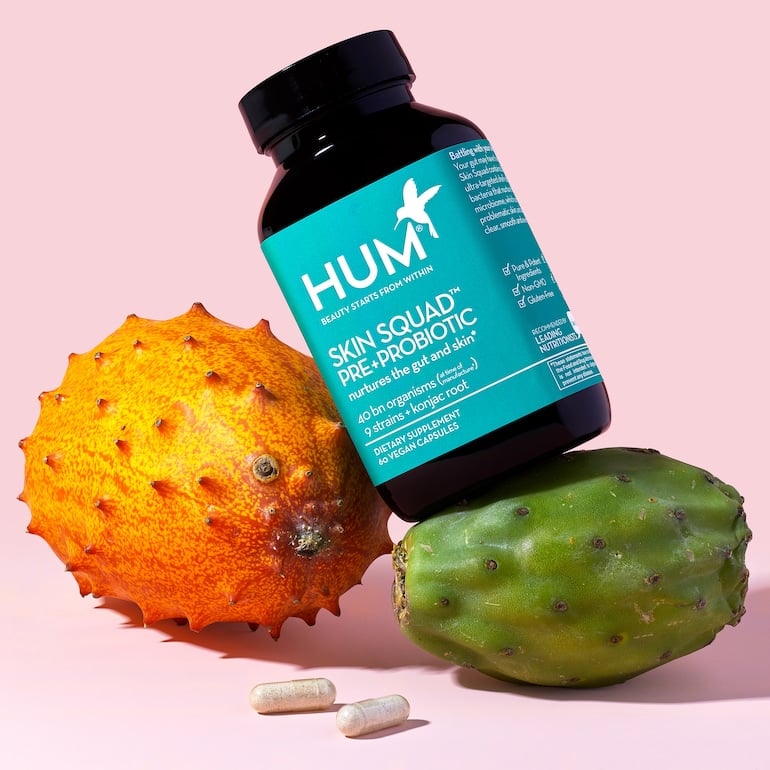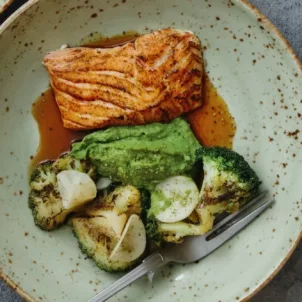The Gut Healthy, Skin-Friendly Root Vegetable That’s Totally Underrated
Konjac is a lesser-known root vegetable (think: beets, ginger) that’s grown in parts of Asia and is particularly popular in Japanese and Korean cooking. You may have even tried it: It’s the main ingredient in Shirataki noodles. In the U.S. it’s more frequently found in the form of a pill or powdered supplement, making it super easy to add to your routine.
Konjac root has been said to improve gut health, clear skin, help suppress appetite, and aid in weight loss. Below, we’ll explore the science behind the health claims of this interesting root. We’ll go more in-depth on the pros and cons, who should take it and who shouldn’t, and how it may help you meet some of your health goals.
What is Konjac Root?
Konjac root is the root from the konjac plant. Due to its fiber content, it is often used to add fiber to supplements in the form of konjac fiber or glucomannan, which is made by processing the root until only the fibrous material remains.
The konjac plant and root differ from glucomannan, which is the specific fiber found in high amounts within the root itself. While the two terms are often used interchangeably and likely serve the same purpose when listed on supplement ingredient labels, they are two different things.
Konjac root is generally recognized as safe by the FDA. While not many studies exist investigating the benefits of konjac specifically, there is plenty of data surrounding the many benefits of fiber.
Konjac Root Benefits
Here are some of the ways fiber from konjac root can benefit your health.
Konjac Root Aids in Weight Loss
Konjac root is a soluble fiber. Soluble fibers absorb water as they go through the digestion process, turning into a gel-like consistency.
Because this type of fiber increases in volume during digestion, it can also help promote feelings of fullness and satisfaction following a meal. As a result, your appetite lessens and you are less likely to consume more calories than needed, which studies show can aid in weight loss.
Promotes a Healthy Gut Microbiome
The soluble fiber in konjac root also gets fermented by the bacteria in your gut, making it a prebiotic fiber. This nourishes your good gut bacteria, helping to keep it at optimal levels and maintain a healthy gut lining. That in turn helps prevent pathogens from entering the body.
There are other reasons you may want to protect the health of your gut. Our microbiome plays a role in stabilizing our mood and maintaining a strong immune system. It may also play a role in weight management–although there is still some debate on this among experts.
What goes on in our stomachs has a lot to do with our overall well-being, so getting enough fiber or supplementing with good sources of fiber like konjac root can be beneficial for multiple areas of health and wellness.
Aids in Bowel Regularity
Constipation can happen for a variety of reasons, from stress to travel to illness. Eating more fiber and drinking plenty of fluids can help move things along and make for a much more comfortable trip to the bathroom.
A study on 64 pregnant women struggling with constipation found that there was a significant increase in the number of bowel movements when supplementing with glucomannan after just one month.
While this may not be one of the main reasons someone reaches for a konjac supplement, if you are struggling with regularity it is certainly a great benefit. After all, regular bowel movements are important for eliminating waste and toxins from the body, and no one needs those sticking around.
Promotes Clear Skin

As a fiber, glucomannan provides food that feeds your gut bacteria and helps it flourish, so it’s no surprise that it can help keep your skin clear.
One review looked at the role of the gut-skin axis in different skin conditions and found that many skin conditions, including acne, can be improved by proper fiber intake. The main way this can happen is by fiber keeping your gut bacteria in check, protecting the lining of your intestine, and preventing inflammation in the gut.
Those struggling with acne may want to up their fiber to improve their gut health and clear up their complexion. HUM’s Skin Squad Pre+Probiotic contains konjac root plus 9 different strains of probiotics to support a clear, even complexion.
May Support Heart Health
Many studies document the ability of soluble fibers like glucomannan to help lower cholesterol, which is often linked to heart health. One of the few high-quality studies out there done on women and the risk of heart disease found that there was a significant link between triglyceride levels and an increased risk of heart failure over time.
Glucomannan can help the body collect and discard certain amounts of cholesterol by preventing its absorption, allowing it to leave the body via stool. A report from the FDA in 2020 updated the definition of dietary fiber to include glucomannan and noted that part of the reason it meets this qualification is its demonstrated ability to reduce cholesterol levels favorably. This suggests that eating foods or taking supplements with fibers like glucomannan could help prevent heart disease if taken consistently.
In fact, a study in Japanese men found that consuming glucomannan with food (rice gruel in this case) resulted in reduced cholesterol and triglycerides shortly after the meal. However, this study didn’t account for what else the participants were consuming during the time they were involved and noted that these results should not be considered prescriptive.
In short, more research is needed to determine how glucomannan may benefit triglyceride levels and heart health, but the data we have so far is promising.
Who Should Try Konjac Root?
If you are interested in improving your gut health and digestion or the appearance of your skin, konjac root may help by feeding the good bacteria in your gut.
It may also benefit those trying to lose weight because it can aid feelings of fullness. When combined with a healthy balanced diet and regular exercise, this may help with weight loss.
Lastly, if you are pregnant or breastfeeding, discuss taking supplements with konjac root with your healthcare provider first, as there is conflicting data on its use during these times.
What to Look for in a Konjac Root Supplement

HUM’s Skin Squad Pre+Probiotic contains konjac root plus nine different strains of probiotics that help nourish your gut microbiome. These probiotics feed on the prebiotic fiber in konjac root, which helps them grow.
There is no standardized dosing recommendation for konjac root, but one study reported no adverse reactions from 1,000mg given to participants with a full glass of water. Supplement available range in their dosages, so start small and see how it affects you. If you experience stomach cramping, excessive bloating, diarrhea, or constipation, consider a lower dose.
HUM’s Skin Squad Pre+Probiotic includes 200 mg of konjac root extract in addition to nine probiotic strains to help nourish your gut microbiome. These probiotics feed on the prebiotic fiber in konjac root, which helps them grow.
Side Effects of Konjac Root
Some people experience bloating and gas from soluble fibers like konjac root. Constipation is also a possible side effect, but this can be reduced by drinking more water or reducing your dose.
If you are taking any prescription medications, consult with your healthcare provider before taking supplements with konjac root in them to make sure it won’t interfere.
If you have symptoms of an allergic reaction such as difficulty breathing or hives, stop taking konjac root immediately and seek medical help.
The Takeaway
Konjac root has many health benefits, from heart health to gut health to weight loss. Like most sources of fiber, it helps primarily by enhancing the health of your gut and suppressing your appetite.
It’s generally considered safe to take konjac root, but be sure to talk to your doctor before starting a new supplement, especially if you take prescription medications.
Lastly, while supplements with fiber are a convenient way to increase your fiber intake, it’s always ideal to consider what changes you can make to your diet to get more fiber. Even if you decide to take a supplement, eating more fruits, vegetables, and whole grains can provide many of the same benefits (and more) that you get from supplements.








